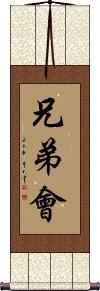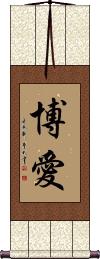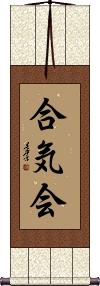Many custom options...
And formats...

Fraternity in Chinese / Japanese...
Buy a Fraternity calligraphy wall scroll here!
Personalize your custom “Fraternity” project by clicking the button next to your favorite “Fraternity” title below...
Fraternity
University Brotherhood / House
Love for Humanity / Brotherly Love
benevolence, love
In Chinese and Korean, 博愛 means a universal fraternity, brotherhood, or universal love.
In Japanese, this means charity, benevolence, philanthropy, or love for humanity.
Please note these subtle differences and take that into account depending on your intended audience (Chinese, Korean or Japanese).
See Also: Benevolence | Altruism
Aikikai
合気会 or “Aikikai” is the original school of Aikido.
Several organizations use this title. The first was established in Japan in 1940 (The Aikikai Foundation or 財団法人合気会).
The only difference between this title and Aikido is the last character, “kai” which means club, group, fraternity, organization, or assembly.
Note: 合気会 may be romanized with a dash like this: Aiki-Kai.
These search terms might be related to Fraternity:
Alone With Only Your Shadow for Company
Labor Union / Trade Union
Misery Loves Company
Not the results for fraternity that you were looking for?
Below are some entries from our dictionary that may match your fraternity search...
| Characters If shown, 2nd row is Simp. Chinese |
Pronunciation Romanization |
Simple Dictionary Definition |
兄弟 see styles |
xiōng dì xiong1 di4 hsiung ti kyoudai(p); keitei / kyodai(p); kete きょうだい(P); けいてい |
More info & calligraphy: Brothers(1) (See ご兄弟) siblings; brothers and sisters; (2) brothers; (3) siblings-in-law; brothers-in-law; sisters-in-law; (4) (familiar language) (masculine speech) mate; friend; (personal name) Kyōdai Elder and younger brothers; brother, brethren, i. e. members of the fraternity. |
博愛 博爱 see styles |
bó ài bo2 ai4 po ai hiroyoshi ひろよし |
More info & calligraphy: Love for Humanity / Brotherly Love(noun - becomes adjective with の) charity; benevolence; philanthropy; (love for) humanity; fraternity; brotherhood; brotherly love; love of fellow man; (male given name) Hiroyoshi to love universally without discrimination |
兄弟會 兄弟会 see styles |
xiōng dì huì xiong1 di4 hui4 hsiung ti hui |
More info & calligraphy: Fraternity |
五逆 see styles |
wǔ nì wu3 ni4 wu ni gogyaku ごぎゃく |
(1) {Buddh} five cardinal sins (killing one's father, killing one's mother, killing an arhat, shedding the blood of a Buddha, causing a schism within the sangha); (2) (hist) crime of killing one's master, father, grandfather, mother, or grandmother pañcānantarya; 五無間業 The five rebellious acts or deadly sins, parricide, matricide, killing an arhat, shedding the blood of a Buddha, destroying the harmony of the sangha, or fraternity. The above definition is common both to Hīnayāna and Mahāyāna. The lightest of these sins is the first; the heaviest the last. II. Another group is: (1) sacrilege, such as destroying temples, burning sutras, stealing a Buddha's or a monk's things, inducing others to do so, or taking pleasure therein; (2) slander, or abuse of the teaching of śrāvaka s, pratyekabuddhas, or bodhisattvas; (3) ill-treatment or killing of a monk; (4) any one of the five deadly sins given above; (5) denial of the karma consequences of ill deeds, acting or teaching others accordingly, and unceasing evil life. III. There are also five deadly sins, each of which is equal to each of the first set of five: (1) violation of a mother, or a fully ordained nun; (2) killing a bodhisattva in a sangha; (5) destroying a Buddha's stūpa. IV. The five unpardonable sin of Devadatta who (1) destroyed the harmony of the community; (2) injured Śākyamuni with a stone, shedding his blood; (3) induced the king to let loose a rutting elephant to trample down Śākyamuni; (4) killed a nun; (5) put poison on his finger-nails and saluted Śākyamuni intending to destroy him thereby. |
交遊 交游 see styles |
jiāo yóu jiao1 you2 chiao yu kyōyu こうゆう |
to have friendly relationships; circle of friends (noun/participle) friend; friendship; companionship; fraternization; fraternity; comradeship; acquaintance to make friends |
八穢 八秽 see styles |
bā huì ba1 hui4 pa hui hachie |
Eight things unclean to a monk: buying land for self, not for Buddha or the fraternity; ditto cultivating; ditto laying by or storing up; ditto keeping servants (or slaves); keeping animals (for slaughter); treasuring up gold, etc.; ivory and ornaments; utensils for private use. |
友愛 友爱 see styles |
yǒu ài you3 ai4 yu ai yume ゆめ |
friendly affection; fraternal love fraternity; friendship; (female given name) Yume |
同人 see styles |
tóng rén tong2 ren2 t`ung jen tung jen doujin(p); dounin / dojin(p); donin どうじん(P); どうにん |
people from the same workplace or profession; co-worker; colleague; (fandom) fan creator or enthusiast involved in derivative works (e.g. fan fiction, fan art) (1) same person; (2) said person; the person in question; (3) coterie; clique; fraternity; kindred spirits; comrade; colleague; (4) (どうじん only) dōjin; doujin; Japanese fans or hobbyists who produce their own magazines, manga, software, etc. |
換帖 换帖 see styles |
huàn tiě huan4 tie3 huan t`ieh huan tieh |
to exchange cards containing personal details (when taking an oath of fraternity) |
毛頭 毛头 see styles |
máo tóu mao2 tou2 mao t`ou mao tou moutou / moto もうとう |
(adverb) (with neg. sentence) (not) in the least; (not) at all; (not) a bit; (surname) Moutou idem 毛道; also, a barber-monk who shaves the fraternity. |
七僧齋 七僧斋 see styles |
qī sēng zhāi qi1 seng1 zhai1 ch`i seng chai chi seng chai shichisō sai |
A "western″ term meaning an endowment for a complete monastic fraternity of seven monks. |
倶楽部 see styles |
kurabu クラブ |
(ateji / phonetic) (kana only) club; fraternity; sorority; clubhouse |
八念法 see styles |
bā niàn fǎ ba1 nian4 fa3 pa nien fa hachi nenhō |
Or 八念門. Eight lines of thought, in the智度論 21 , for resisting Māra-attacks and evil promptings during the meditation on impurity, etc.; i.e. thought of the Buddha, of the Law (or Truth), the fraternity, the commandments, alms-giving, the devas, breathing, and death. There are also the 大人八念 , i.e. that truth 道 is obtained through absence of desire, contentment, aloneness, zeal, correct thinking, a fixed mind, wisdom, and inner joy. v. 八念經. |
八敬戒 see styles |
bā jìng jiè ba1 jing4 jie4 pa ching chieh hakkyōkai |
The eight commands given by the Buddha to his foster-mother, i.e. aunt, when she was admitted to the order, and which remain as commands to nuns: (1) even though a hundred years old a nun must pay respect to a monk, however young, and offer her seat to him; (2) must never scold a monk; (3) never accuse, or speak of his misdeeds; but a monk may speak of hers; (4) at his hands obtain reception into the order; (5) confess sin (sexual or other) before the assembly of monks and nuns; (6) ask the fraternity for a monk as preceptor; (7) never share the same summer resort with monks; (8) after the summer retreat she must report and ask for a responsible confessor. Also 八敬法; 八不可越法 (or 八不可過法) ; 八尊重法; v. 四分律 48. |
十功德 see styles |
shí gōng dé shi2 gong1 de2 shih kung te jū kudoku |
(十功德論) Ten merits (or powers) commended by the Buddha to his bhikṣus—zealous progress, contentment with few desires, courage, learning (so as to teach), fearlessness, perfect observance of the commands and the fraternity, regulations, perfect meditation, perfect wisdom, perfect liberation, and perfect understanding of it. |
友愛会 see styles |
yuuaikai / yuaikai ゆうあいかい |
fraternal association; friendship society; fraternity |
七僧法會 七僧法会 see styles |
qī sēng fǎ huì qi1 seng1 fa3 hui4 ch`i seng fa hui chi seng fa hui shichisō hōe |
An assembly of a monasterial fraternity. |
十不悔戒 see styles |
shí bù huǐ jiè shi2 bu4 hui3 jie4 shih pu hui chieh jū fuke kai |
The ten rules which produce no regrets—not to kill, steal, fornicate, lie, tall of a fellow -Buddhist's sins, deal in wine, praise oneself and discredit others, be mean, be angry, defame the Triratna (Buddha, Law, Fraternity). |
Variations: |
kouyuu / koyu こうゆう |
(n,vs,vi) friendship; companionship; fraternity; comradeship |
東亜親善協会 see styles |
touashinzenkyoukai / toashinzenkyokai とうあしんぜんきょうかい |
(o) East Asian Fraternity Association |
Variations: |
kouyuu / koyu こうゆう |
(n,vs,vi) friendship; companionship; fraternity; comradeship |
倶楽部(ateji) |
kurabu クラブ |
(kana only) club; fraternity; sorority; clubhouse |
Variations: |
kurabu クラブ |
(kana only) club; fraternity; sorority; clubhouse |
The following table may be helpful for those studying Chinese or Japanese...
| Title | Characters | Romaji (Romanized Japanese) | Various forms of Romanized Chinese | |
| Fraternity | 兄弟會 兄弟会 | xiōng dì huì xiong1 di4 hui4 xiong di hui xiongdihui | hsiung ti hui hsiungtihui |
|
| Love for Humanity Brotherly Love | 博愛 博爱 | hakuai | bó ài / bo2 ai4 / bo ai / boai | po ai / poai |
| Aikikai | 合気会 / 合氣會 合気会 | ai ki kai / aikikai | ||
| In some entries above you will see that characters have different versions above and below a line. In these cases, the characters above the line are Traditional Chinese, while the ones below are Simplified Chinese. | ||||
Successful Chinese Character and Japanese Kanji calligraphy searches within the last few hours...






